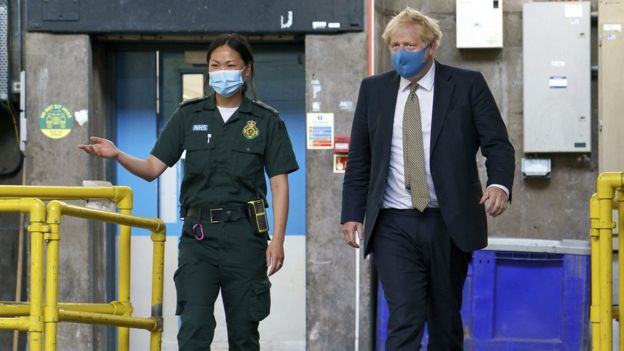Wearing a face covering in shops and supermarkets in England is to become mandatory from 24 July.
Those who fail to comply with the new rules will face a fine of up to £100, the government is to announce.
The move will bring England into line with Scotland and other major European nations like Spain, Italy and Germany.
Since mid-May, the public have been advised to wear coverings in enclosed public spaces, where they may encounter people they would not usually meet.
It has been compulsory on public transport in England since 15 June.
Children under 11 and those with certain disabilities will be exempt.
Environment Secretary George Eustice told BBC Breakfast the new mandatory rule for face coverings in shops does not apply to retail staff.
"It is about managing the overall risk," he added. "Any type of covering will be sufficient for this purpose."
There has been a reported increase in the use of face coverings by people in England, Scotland and Wales.
More than half of adults surveyed by the Office for National Statistics in the first week of July said they used a covering while outside their home.
Meanwhile, a report requested by the government's chief scientific adviser suggests the UK could see around 120,000 new coronavirus deaths in hospitals during a "reasonable" worst-case scenario this winter.
It comes as Scotland recorded no new coronavirus deaths for the sixth day in a row, with a further three positive cases identified since Monday. UK figures will be released later.
- Why have attitudes to face masks changed?
- How to make your own face mask
- Why do customers have to wear face coverings but not staff? And other questions
Labour said ministers' had been "slow and muddled" on face coverings and questioned why the new rules would not come into force for 11 days.
But Mr Eustice said research on the use of face coverings, including advice from the World Health Organization, had been "evolving".
And he added:
- The delay between the announcement and the rule coming into force on 24 July "gives people time to prepare" but people will start wearing coverings from today
- People are "intelligent and responsible enough" to wear face coverings and the mandatory rule sends "a much stronger signal that people will follow in greater numbers"
- Wearing face coverings in shops is an "appropriate mitigation" against the "overall risk" of the coronavirus but the rule would not work in pubs, cafes or restaurants

Mr Eustice told BBC Radio 4's Today programme: "With all of our laws there is an element of policing by consent and so we need the public to play their part and abide by the restrictions."
The latest rules for shops will be enforced by the police, with anyone disregarding them at risk of a fine of up to £100. This will be reduced to £50 if people pay within 14 days.
While shop workers will be encouraged to prompt customers to comply, they will not be expected to enforce the rules, allaying unions' concerns about their involvement.

Growing demands on police

During lockdown, police in England issued around 16,000 fines for alleged breaches of the restrictions.
Enforcing the rules was not always easy, particularly because the regulations were drawn up at the last minute, but forces did at least have enough resources - as crime and emergency calls had fallen sharply.
Now, as the country begins to return to normal, demands on police time are growing again.
That's one reason why officers don't want the extra burden of dealing with non-compliant shop customers.
Another factor is a concern is that it may draw police into confrontations with the public at a time when the service is already under the spotlight for its use of tactics, such as stop-and-search.
However, the way the face-covering rules are likely to be drafted means it will be the police, not shop staff, who will be called upon if people refuse to abide by the measures.

Ken Marsh of the Metropolitan Police Federation suggested enforcing the new rule could strain the relationship between police officers and the general public.
And John Apter of the Police Federation said it should be down to shops to make wearing a face covering a "condition of entry".
In Scotland, the use of coverings in shops has been mandatory since 10 July - but few fines have been issued.
Shoppers in Wales and Northern Ireland are not currently required to wear them, although both nations have said this will be kept under review.

Will customers be happy?
Face coverings steam up your glasses, they're uncomfortable, they infringe on personal freedom, according to BBC Radio 5 Live listeners.
Andy, from Manchester, says the discomfort means he's less likely to go to the shops and now worries shopping must carry a higher risk than he thought.
But there's reassurance from Scotland, where face coverings have been mandatory in shops since Friday.
Pamela, who runs a clothes shop in East Kilbride, says most of her customers have been happy to wear one - only one refused because they didn't like it.
- Do you work in a shop? How are you preparing for the new rules? Email: haveyoursay@bbc.co.uk.

Boris Johnson signalled a shift in the government's position on Friday when he spoke of the need for a stricter approach in confined setting.
But Cabinet Office minister Michael Gove downplayed the suggestion of any immediate legal change on Sunday.
'Slow and muddled'
Labour said the mixed messages demonstrated the government's indecision during the pandemic, and ministers had to explain the "further delay".
"The government has been slow and muddled again," shadow health secretary Jonathan Ashworth said.
 DOWNING STREET
DOWNING STREET
A No 10 spokesman said: "There is growing evidence that wearing a face covering in an enclosed space helps protect individuals and those around them from coronavirus.
"The prime minister has been clear that people should be wearing face coverings in shops and we will make this mandatory from 24 July."
Unions and businesses have said the new guidance must be "clear and detailed" to protect staff and customers.
While welcoming clarity over the issue, shop workers union Usdaw said coverings could not be a substitute for strict hygiene controls and social distancing measures.
Source: https://www.bbc.com/

No comments:
Post a Comment